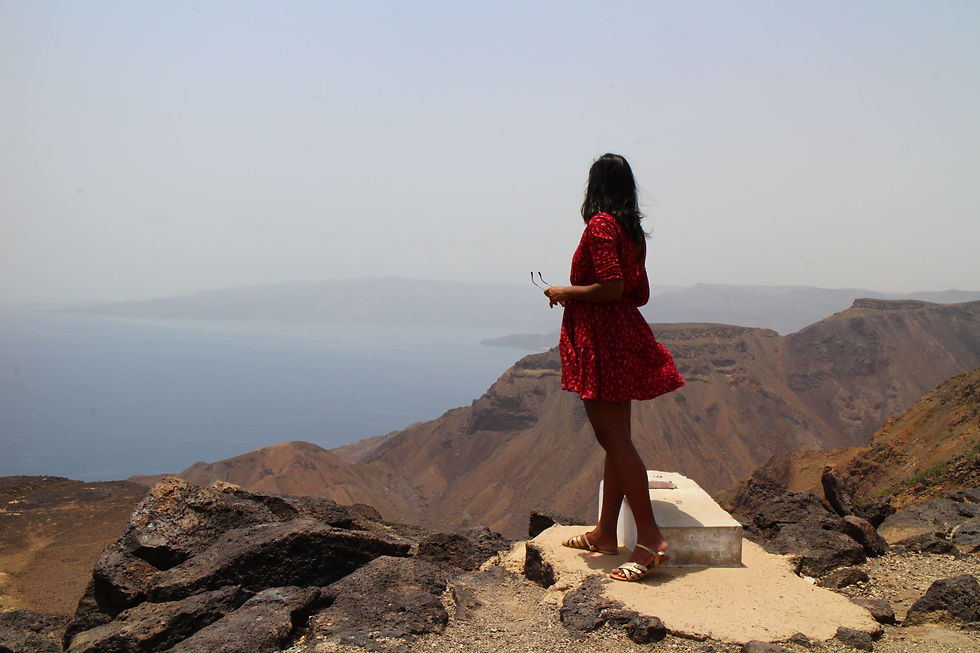The lowest point...
...in Africa is Lake Assal, in Djibouti - a tiny, special country on the East Coast of Africa. Hemmed in by Ethiopia, Eritrea and Somalia, and the Gulf of Aden, it serves as host to some serious military bases and joint forces tackling the insecurity in the region. Unsurprisingly, it is one of the least visited countries in the world.

It was little wonder, then, that I was almost denied a visa on arrival (but thank God for the strength of the Mauritian passport!) as border control scrutinised my short trip with immense suspicion - after all, who chooses Djibouti as a holiday destination when it's not only Ramadan, but also the onset of peak summer with temperatures hitting 40 degrees and beyond?
A disorganised idiot, that's who.
I've been keen to explore Africa through diving, being curious about our maritime history and future. Someone recommended Djibouti - and although the best time to go is at the end of the year when whale sharks come to visit, I decided to check it out.

It's safe to say that the dives in Djibouti bowled me over, and they were the best dives I've had. Booking my dives with Dolphin Excursions, I was skeptical about the whole thing, especially as this wasn't diving season.
The water was 30 degrees, so we jumped in without wet suits; I've never seen such lush marine life: there were thousands of fish and thriving corals even in this heat.





But Djibouti had more to offer than its oceans. The streets of the city were deserted during the day, due to the fasting period I'm guessing? Except for some areas where it's pandemonium; cars and people jammed in narrow streets, navigating food purchases for the breaking of the fast. A sensory overload.

As evening fell, the sound of the azaan called people for prayer. At some point, a rich female chorus echoed over the bustling streets.


I'm guessing if I came at another time, I could get a truer picture of the chaotic life in the small shops, the roadside stalls where women draped in colourful robes sold watermelons and fruits and nuts, peddlers and busy people walking by.


But you can't come to Djibouti and not go to Lake Assal - the country's main tourist attraction. At 155m below sea level, it is Africa's lowest point and the landscape is surreal.

The trip from Djibouti town to Assal has its own picturesque moments - I thoroughly enjoyed the trip. Getting out of Djibouti town can be initially tedious, as the road is clogged with hundreds of trucks making their way from the port to Ethiopia. Carcasses of trucks, some weathered, some fresh, litter the sides of the road - a reminder of the perils of the journey.
But once you're out, you get to see interesting things. I didn't see any of the 'bamboons' that are said to come down from the mountains to pick up the grains spilled from the convoys, but I did see a goat chilling on a tree and a camel leading the way.


Or you admire the different treasures of the land: from mountains to the beauty of the Goubet Bay and the geothermal attractions of the Ardouboka fissure vents...


You wonder how life happens here. The terrain is inhospitable, evocative in its harshness; water is scarce and only available once a week through the water trucks that travel to these remote places.

The people here learn to live with it. I, on the other hand, waited for the wind to blow me away.

Overlooking the bay, where the thick silence drowns out the wails of slaves who were shipped off from here centuries ago, thus as it conceals the sounds of war unfolding in the neighbouring countries and across the Gulf of Aden.



The volcanic fissures emit intense heat, which almost toppled me over.


The water's equally warm: by this point, I had to turn back as I was struggling to breathe in the heat.

I was saddened to see the amount of litter, mainly plastic bottles, which was strewn all across the country, even in remote places.

Eventually reaching the bleak landscape of Lake Assal is a mindblowing moment in itself.
A hazy sky blends into the contours of the lake: a glassy blue-green stretch of water rimmed by white - what initially looks like soft sand but is in fact compacted salt.


It's in fact the palette of the landscape which I could not get over: pastel and hazy blues, greens and browns, the whole place seemed desaturated, as if someone had overdone a VSCO filter and washed the colours out.
That, coupled with the rolls of heat, gave the whole place an almost apocalyptic feel.




The heat is almost unbearable, it rolls in and the wind offers no respite. The water appears tantalising, but it's a minefield of jagged salt crystals. When you do let yourself in, it's warm and saltier than the sea: floating feels like being on a mattress.



Don't make the mistake of tasting the water. If accidentally drinking sea water is disgusting, the waters of Lake Assal are ten times saltier - and just as disgusting.


I'm not sure I entirely enjoyed the sensation of floating: I felt the water was pushing me back.


It's in fact so salty that it evaporates into a crust on your skin, in your hair, on your clothes.


I confess that the heat got to me and I was unable to marshall the energy or courage to go out exploring on the last day, so it was spent in the lush corridors of the Kempinski Hotel's spa.






































Comments